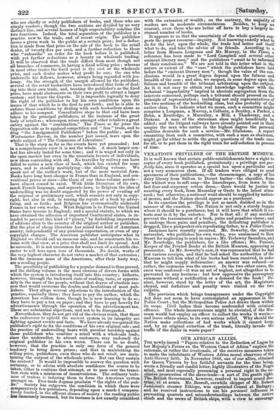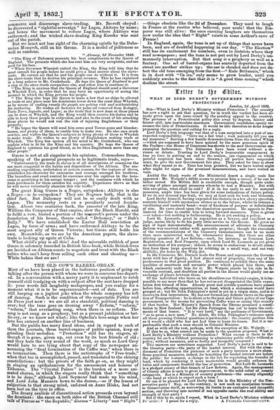OUR AFRICAN ALLIES.
Tun newly-issuel "Papers relative to the Reduction of Lagos by her Majesty's Forces on the Western Coast of Africa" explain the rationale, or rather the irrationale, of the coercive measures taken to make the inhabitants of Western Africa moral observers of the Anti-Slavery faith. In November 1848, one of our allies, obtained for Queen Victoria by her faithful servants for the time being, wrote a friendly and candid letter, highly illustrative of the Negro mind, and most especially presuming a personal right to the ex- clusive prosecution of the slave-trade—a sort of Del gratia right. The British Government, however, resolved to import sound doc- trine, vi et amis. Mr. Beoroft, erewhile skipper of Mr. Robert Jamieson's steamer Ethiore, was appointed Consul at Badagry; and he received instructions to use his personal influence in • preventing quarrels and misunderstandings between the native chiefs and the crews of British ships, with a view to encourage
commerce and discourage slave-trading. Mr. Beeroft obeyed : he discovered a "rightful sovereign" for Lagos, Akitoye by name; and hence the movement to reduce Lagos, where Akitoye was enthroned; and the wicked slave-dealing King Kosoko was sent out of the parish. But we must not lose sight of the charming epistle by the Daho- meian Monarch, still on his throne. It is a model of politeness as well as candour. " 2lbotney, 3d November 1848. "The King of Dahomey presents his best compliments to the Queen of England. The presents Which she has sent him are very acceptable, and are good for his face. "When Governor Winniett visited the King, the King told him that he must consult his people before he could give a final answer about the slave- trade. He cannot see that he and his people can do without it. It is from the slave-trade that he derives his principal revenue. This he has explained in a long palaver to Mr. Cruikshank. He begs the Queen of England to put a stop to the elave-trade everywhere else, and allow him to continue it. "The King is anxious that the Queen of England should send a Governor to Whydah Fort, in order that he may have an opportunity of seeing the manner in which the King governs his people.
" The King also begs the Queen to make a law that no ships be allowed to trade at any place near his dominions lower down the coast than Whydah, as by means of trading vessels the people are getting rich and withstanding Ms authority. He wishes all factories for palm-oil removed from Badagry, Porto Novo, Aquado, and Lagos; as the trade that is now done at these places can be done at Whydah, and the King would then receive his duties and be able to keep these people in subjection, and also in the event of his attacking these places he would not run the risk of injuring Englishmen or their property. "He hopes the Queen will send him some good Tower-guns and blunder- busses, and plenty of them, to enable him to make war. He also uses much cowries, and wishes the Queen's subjects to bring plenty of them to Whydah to make trade. He wishes to see plenty of Englishmen making trade at Whydah. The King has spoken all his mind to Mr. Cruikshank, who can explain what is fit for the King and his country. He begs the Queen of England to continue his good friend, as he likes Englishmen more than any other people."
Guezo is not at all singular in his opinions. Commodore Bruce, speaking of the general prospects as to legitimate trade, says- " Unfortunately the trade in slaves is of all descriptions of commerce the one most congenial to the habits and dispositions of the African. The ma- rauding expeditions, undertaken at certain seasons, for the capture of slaves, establishes his character for enterprise and courage amongst his brethren. The boundless and cruel control he exercises over his captives in the bora- coons is gratifying to his savage temper ; and the readiness with which he finds purchasers for them satisfies his cupidity. Experience shows us that he will never voluntarily abandon this vile traffic."
The great King Guezo is a Negro, outspoken ; Akitoye is also a Negro—is he outspoken P They are Negroes both, that is the chief fact. But Dahomey will not be so easily dealt with as Lagos. The monarchy rests on a peculiarly sacred founda- tion. About two centuries back, the ancestor of the late King, William the Conqueror of that empire, slew the Black Harold, and to fulfil a vow, buried a portion of the manarch's person under the foundation of his house, thence called " Dehomey," or "Dab's Belly." We have established the Exeter Hall conviction at Lagos, by force of arms; and have enthroned Akitoye to be the most august ally of Queen Victoria ; but Guezo still holds his own. Meanwhile, as we see by the American papers, the slave- trade is looking up again at Cuba.
What child's play is all this ! And the miserable rubbish of poor Guezo is solemnly recorded in British blue-book, while British lives are lavished on African coasts to negotiate and treat with the Black babies who can't keep from selling each other and cheating US— White babies that we are !



























 Previous page
Previous page